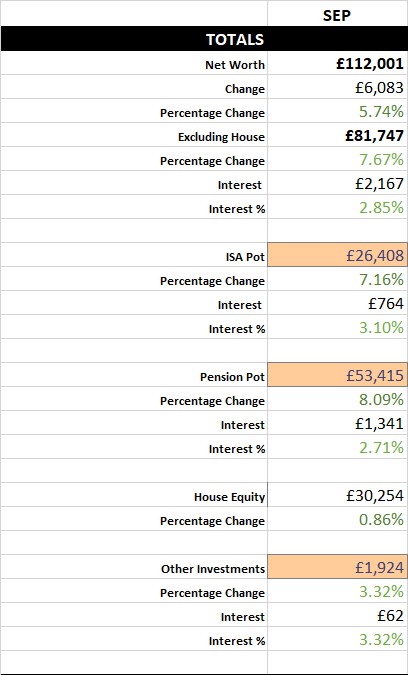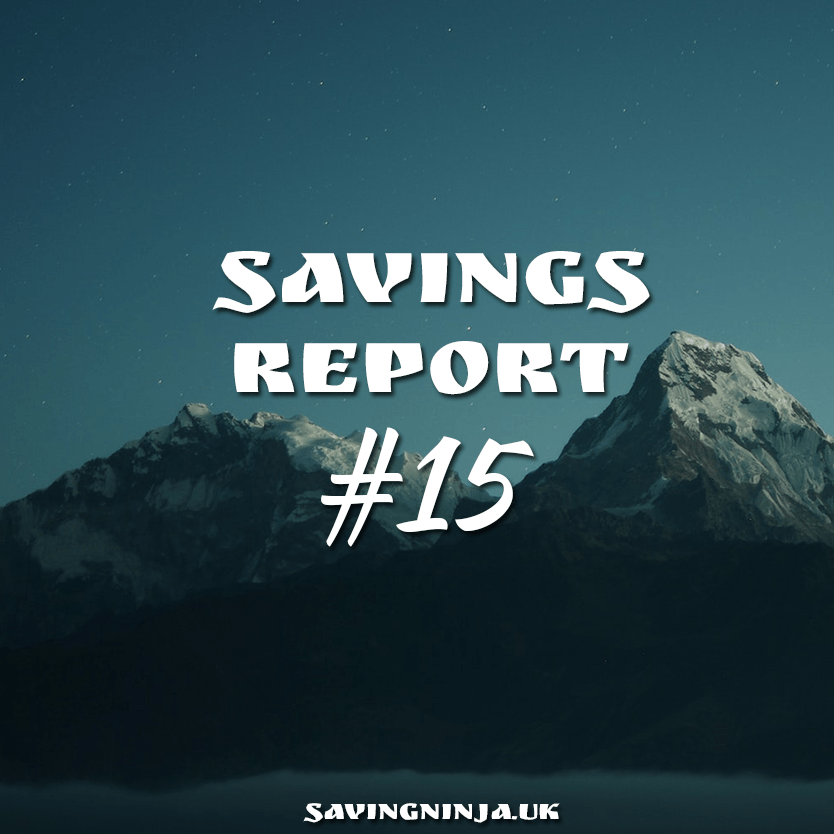This is a Saving Ninja savings report. Go to How To Track Your Savings to check out the Saving Ninja Super Spreadsheet. Please note that I split my expenses equally with my partner and the savings rate, house equity and house value represent my share only. The spreadsheet calculates my savings rate based off £12,000 worth of expenses per year, even though my expenses are actually Less Than 10k Per Year . This is to create a buffer; I’m aiming for at least 12k to reach financial independence.

After a staggering loss last month I’ve almost made it all back this month!
My net worth now sits at £112k and my ‘years to FI’ has shot down to 3 years and 3 months.
I can’t actually believe that at the beginning of this year , my total net worth was 65k, it’s now almost doubled just 9 months later [note]Alright maybe not quite doubled just yet![/note].
I’m blaming this on the awesome gains which happened this year in my stock portfolio.
The Accumulator wrote an excellent post this month stating that Vanguard’s US Equity Index fund has grown by a whopping 16.3% annualised over the last 10 years, I can’t imagine how fast these peoples investments must have grown. I only hope I can get some action as good as this when my nest egg sits above 100k!
Speaking of investments, they now sit at £81,747. I’m getting pretty close to that 100k figure ! I’m really hoping that I can reach it before the end of the year as I’m planning on dumping some extra money into my ISA as I’ve got 8k to fill before April.
It’s probably not going to happen, but I’ll hopefully be close. That should give my 100k a whole year of compounding in 2020 (or correctioning!)
I’ve added some new columns into the spreadsheet to show annual growth, I’m planning to add a whole lot more. I’ll document all of these in the ‘2019 reviewed’ article which I’ll post at the end of the year along with my time-series predictions for 2020.
Other News
The boiler fitting went well, although the day after we had it installed our electrics decided to stop working for two lights. We’ve now got an electrician coming out (for the first time) on Friday who’s ripping us off by charging £85 just to look at the problem.
I did attempt to fix the issue myself by replacing the light fittings but the problem seems to be something in the loft that I can’t identify. I just hope he can actually fix it for this insane fee.
Things like this make me wish I’d bought a newer house that has modern electrics and walls that don’t crumble when you drill into them. I’d have a pretty good chance of being able to fix most things that came up myself then, I hate paying for labor jobs.
Contracting
I ended up interviewing for a couple of positions, one fully remote and permanent and one a short contracting gig. I got a job offer on both but not for the price that I was asking for.
I decided to turn them both down and stick it out with my current position until the middle of next year and change my approach a little. This is mainly due to the IR35 changes coming into effect in April, a lot of the bigger corporations (like the one I work for now) seem to be forcing all of the contractors to switch to a permanent position or not renewing their contracts. Things like this will make the freelancing market a lot more competitive, at least until the dust has settled after April.
In short, it’s a terrible time for me to switch! I have a pretty decent salaried permanent job at the moment, so it makes sense for me to weather out the storm whilst still earning and saving a lot rather than taking a risk.
New Plan
I read a great article this week which stated how interviewing in the software industry is a skill in of itself which you need to master if you want to apply to the big boys of the software world, a skill that doesn’t necessarily relate to how good you are at your actual job.
This made me think ‘shit, I’m going to be applying to jobs in Silicon Valley eventually, I need to perfect this skill!’ Up until now, I’ve shied away from applying to the ‘big boys’ such as the Facebooks or Googles of London mainly due to a few things:
I didn’t think I had enough experience yet.
I didn’t think I was good enough.
But now I’m a bit more mature in the job world I see that point 2 is all about training. To pass these grueling 6 hour interview days you need to be good at interviewing which is a skill more akin to a lecturer than a real-life software developer.
I need to be able to spout data structures and patterns by heart like a living textbook. This is what’s needed when these companies have hundreds of thousands of applicants to choose from, and it’s what’s needed for Silicon Valley too.
So, basically, I need to go back to school. I’m staying at my position for at least another 6 months, I’ve ordered Cracking the Coding Interview and I’m going to make a learning schedule that is mixed between analysing this book, doing coding challenges, and contributing to open source.
I’m going to make a portfolio website and basically become the dogs bollocks when it comes to the skill of interviewing. I’m then going to apply for all of the most notoriously difficult positions in the software world which are available in London.
I’ll do this for two reasons:
If I get one of these jobs it will gleam on my CV and I’ll then be able to get a job virtually anywhere, even in Silicon Valley. I could even get a transfer to the USA from within the new company.
If I don’t get offered any jobs, I’ll still get experience with difficult interviews. This will be needed when I’m applying for positions abroad and it may be what I need to actually land one.
So, yeah, I like a challenge! I’ll probably do a few posts on how I’m going about digesting all of the technical knowledge as I’m planning to learn how to properly annotate a book and create mind maps.
I’m also going to set a vigorous schedule to help me achieve every varied learning activity that I want to within the week. I was thinking of trying out Habitica , has anyone used this before?
Anyway, enough blabbing, see you next month!
